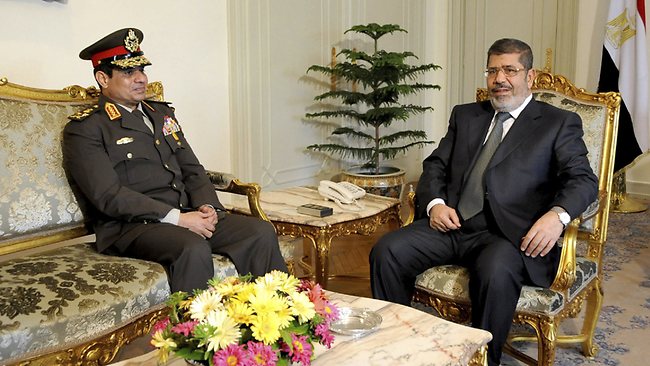
As President Mohamed Morsi was addressing the nation, stressing his role as Egypt’s first democratically president, Egyptian state newspaper Al Ahram had already published what it describes as the Supreme Council of the Armed Forces roadmap for the coming months in Egypt.
The following is a loose translation of Al Ahram’s article:
The last twenty-four hours have witnessed intensive efforts to persuade President Mohamed Morsi to resign and to ward off the risks posed to the country along with its territories.
Al-Ahram has learned that with the close of the forty-eight hour deadline set by the Armed Forces, one of two things is expected: either the President will have to announce his resignation himself, or his dismissal will be declared through the road map as presented by the Armed Forces. The main points presented include:
-
Cancellation of the constitution, drafting of a new constitution by a committee of experts, while taking into account the demands of all groups in society. The draft constitution then must first be approved by Al-Azhar and sent to a public referendum.
-
A presidential council will be formed consisting of three members, headed by Chief Justice of the Supreme Constitutional Court, and the other two have yet to be determined. This council will manage the affairs of the country during a transitional period ranging from nine months to a year.
-
The formation of an interim government does not belong to any political currents but will be headed by one of the military leaders during the transitional period.
-
Preparations for presidential and parliamentary elections; the new constitution will determine which comes first.
-
The army, throughout the transitional period, will oversee these procedures and the steps in the road map to ensure unbiased and a balanced implementation of the plan.
-
Al Ahram reports that the Armed Forces has coordinated with the security forces to detain Muslim Brotherhood leaders, placing them under house arrest and has confiscated their weapons and funds.
Furthermore, security forces have been instructed to deal firmly with all who resist these decisions, and they will be placed under house arrest before going before a court, possibly a revolutionary court. They were further instructed to deal firmly with outlaws and criminals both in Sinai and other areas.
The anonymous source expects this plan and these developments to be received well internationally, stating that there was coordination with foreign governments.
It is also worth mentioning that the past forty-eight hours have witnessed significant security measures that guaranteed the protection of demonstrators in the vicinity of Qubba Palace, the Itihadeya Palace, and Tahrir Square. Additionally, security forces have launched raids on sites belonging to members of the Muslim Brotherhood and the Freedom and Justice Party, while also issuing travel bans on a large number of FJP members.
Earlier, Reuters had published the Supreme Council of the Armed Forces’ (SCAF) leaked roadmap which included the suspension of the constitution, dissolution of the Shura Council, and the formation of an interim “council”(made of civilians and technocrats). They would run the country until an amended constitution is drafted. Reuters added that SCAF had not finalized the details of the plan, and that it “could be changed based on political developments and consultations.”
Unlike Al Ahram, Reuters reported that presidential elections would follow the drafting of a new constitution, while parliamentary elections would not be held until an electoral law outlining candidate selection was enforced.
Reuters added that the SCAF’s roadmap was similar to that proposed by the opposition coalition, the National Salvation Front (NSF), while a military source stressed that the transition would differ greatly from SCAF’s 18-month rule following Mubarak’s ouster. The roadmap published by Al Ahram, however, places significant power in the military’s hands.
Image: Morsi%20Sisi.jpg
